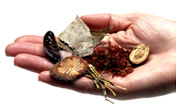The Rediff US Special/Arthur J Pais



If you are taking alternative medicine like herbal products, you must tell your doctor, insists P Murali Doraiswamy, a psychiatrist and professor at Duke University.
His views on the side effects of herbal medicine when used along with Western medicine have brought him attention across America -- not only in medical journals but also in numerous television interviews and mainstream publications.
"A lot of people don't think of herbs as medicines," he warns. "People have a tendency not to attribute complications to herbal products. They are going to blame prescriptions instead."
On the other hand, many doctors do not ask the patients about their use of herbal medicine, he notes. Since no medical school in America offered herbal medicine courses till recently, many doctors are ignorant of such medicine.
"Some doctors don't ask the question because it opens the Pandora's box they don't how to deal with," he says. On many occasions, Doraiswamy, who has worked at Duke for nearly a decade and is currently the director of clinical trials in psychiatry there, becomes the enemy of holistic medicine as well as traditional medicine. "My research puts me in the crosshairs of both herbalists and drug manufacturers," he says.

"I receive angry calls from herbalists when I publish a negative report on a herbal treatment. Likewise, if my research shows an alternative medicine is as effective as a prescription agent, then I make enemies among the drug manufacturers. As long as both sides hate me, I feel I am well positioned to serve the general public. "Being the most hated man in this business can sometimes be the most fulfilling compliment of one's accomplishments."
In an extensive interview, Doraiswamy, who comes from a medical family in Madras, spoke about holistic and traditional medicine, and the precautions people must take when they mix different schools of medicine. He also spoke with regret how many young doctors in India have no interest in holistic medicine. His passion for his profession is evident throughout the interview.
"I grew up in a family where medicine runs in the blood. Both my grandparents [K A Kalyanam and P K Kalyanaraman] were illustrious doctors," he says. "And several uncles and aunts are also doctors.
"Some of my more memorable days were spent in their offices and I think I learned the art of medicine long before I ever went to medical school. I received my MBBS from the University of Madras.
"I came to the United States about ten years ago to get advanced training in research as well as medicine."
What are some of his top achievements as a teacher and a researcher? "As a clinician, it's very fulfilling to successfully treat any illness and in particular conditions like depression which can completely destroy a person's life. Likewise, educating the public and physicians about the latest advances in disease prevention and helping to dispel stigma associated with mental illness is also very fulfilling.
"I enjoy serving as a mentor for trainees and watching them become independent physicians and investigators. As someone who researches both prescription and alternative treatments, I take great care in what I say since it is often widely quoted and sometimes subject to misinterpretation."
This is the first half of a two-part article. Part Two will appear tomorrow.
Design: Lynette Menezes
Back to top
Tell us what you think of this report